Rush
By Bob Dunne, Beetle, December 1974, transcribed by John Patuto
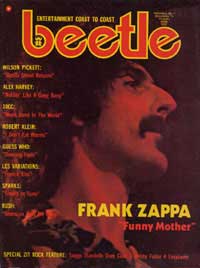
It was about six years back when Geddy Lee, a stringy-haired Ken Hensley look-alike, Alex Lifeson, a typical street punk who just happened to play guitar, and John Rutsey, a pint-sized drummer, decided it was time to give their unique rock'n'roll vision a fighting chance. Forming your proverbial high school band, superstardom seemed just a gig away, as it does to all naïve new bands. Today, six years into the future from that initiation, a flashy trio called Rush knows that stardom is close. And after six years of playing bars, high schools, pubs and dives, they know exactly what it takes to get there.
Rush's first "big break" came about a year ago when, tired of playing the aforementioned loser circuit and making just enough money to meet the payments on their equipment, the hard-rockin' trio opened a local show for The New York Dolls. Tho' Rush readily admits that the show was not one of their best ("I looked out and saw all these people!"), they surpassed The Dolls with ease. It was a turning point.
It was also a turning point for Vic Wilson and Ray Daniels, the band's management team. Previously the band had played the barband rut in order to keep body and soul together. Now, even though it meant making some financial sacrifices, the band was prepared to turn down loser gigs in order to entice better gigs their way. Vic and Ray secured the financing needed to go into the studio and work on Rush's debut album. A producer was found and left to his own devices. Mistake.
The quality of the recording was plainly lacking. No one faltered. Undaunted, they all put their heads and money together and offered the aborted tapes to Terry Brown, a local producer- engineer who has worked with Procol Harum, Thundermug, April Wine and whose studio was used to overdub all the guitar parts, and re-record the really badly done tunes. The result was an album's worth of tunes; loud, raucous and rough material that throbs out of the speakers.
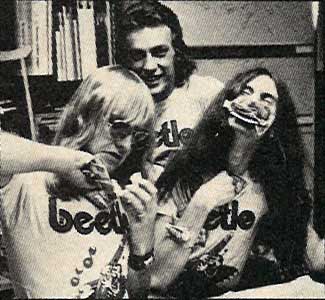
Now came the hard part, soliciting an acceptable label deal from one of the Canadian labels. Asking for virtually no front money and a minimal amount to be spent on promotion, Vic and Ray were still unable to peddle the tapes. Having invested heavily in the product, they were not about to see the album go down the tubes. Moon Records, their own label, was quickly established and the debut album was released with a negligible amount of promotion.
Yet the tiring years in the local circuit paid an unexpected dividend. The initial pressing of the album was sold out quickly, making everyone involved realize that the cult following they had hoped for did, in fact, exist.
Signing a booking contract with the prestigious ATI agency in New York, Rush was enthused about their future potential. ATI in turn forwarded a copy of the Moon Records album to Mercury Records who also had The New York Dolls and was just starting to realize vast amount of cash with their other Canadian 'discovery', Bachman-Turner Overdrive. Quick to pick up on a good thing, Mercury locked up Rush for a two-album contract that was worth somewhere in the region of $200,000. This came at a time when record companies were admittedly cutting back on all expenses, particularly in terms of advances. Where Canadian companies weren't willing to put up five grand for promotions, Mercury was willing to go all the way.
However, success takes a toll. Just before the hotwax windfall came Rush's way, John Rutsey left the band, citing legitimate health reasons and a basic dissatisfaction with the musical direction. This left our heroes up the ol' crick without a paddle. Moreover, ATI had already secured a number of lucrative American gigs for the band, the first of which was a Washington, DC TV show that they were much looking forward to. Enter Neil Peart, a veteran drummer with a number of Ontario bar bands. The change was a good one.
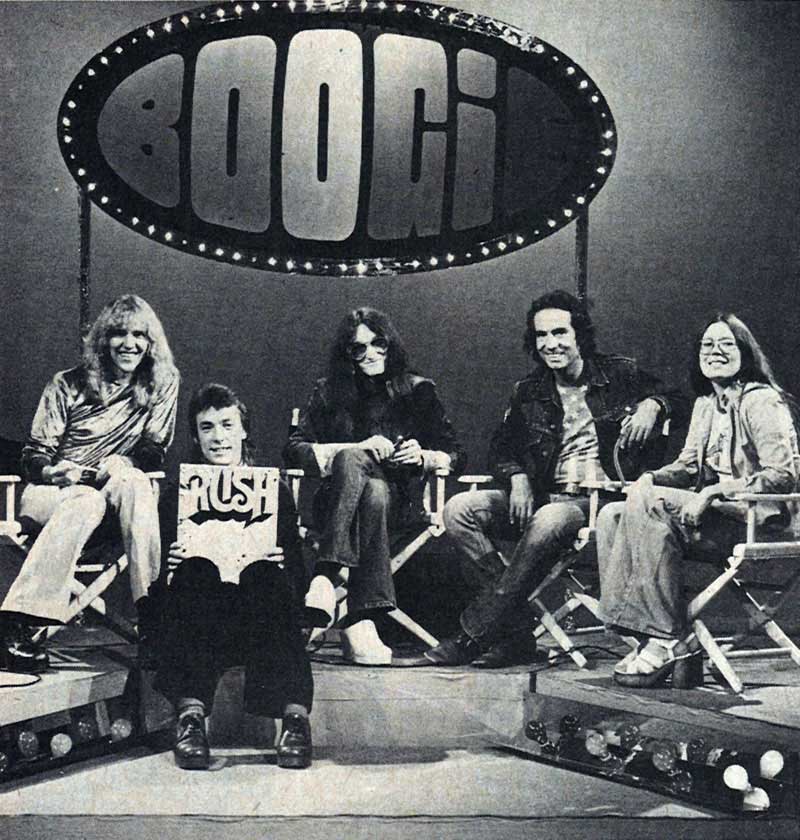
"Rutsey's health was really bad," says Geddy, more compassionate than one might expect. "He was running himself right into the ground. The type of schedule we had is rough on a healthy person. It's hard to put up with, but he was really suffering from having to play so hard so often. Also, Alex and I have always moved in the same musical direction, and he was growing in a different way. I knew ... I think we all knew ... that it was eventually going to happen. It should have happened a year before it did."
So, let's take stock of this situation. We have what must appear to be yet another average contender in the Heavy Metal Final Heat; a band with an almost trite name and an approach to music that has been used several times before. Is that all? Ah, no.
There is one thing to be said for spending endless fruitless years going through the mill. It breeds a confidence and determination that 'overnight successes' and prefabricated 'stars' can only view second-hand. And, aside from whatever hype usually accompanies the signing of an artist, Rush do what they do well. There is no lack of talent in this unit and, once again, playing together for this long has only served to weld what would otherwise have been diverse musical ideas into a strong, seamless Direction.
Rush may not offer any startling new alternatives to what has passed as hard rock in the past, but they are not merely copyists repackaging the same old hat mundane three chords in a totally random stab at the big money. Because of their sincere belief in their music, because of their years of perspiration, because of their infectious enthusiasm, Rush offer an opportunity to experience some first class music played with such energy, a willingness to give the audience what they've paid for. They realize that the musical idiom they are dealing with has not progressed a whole lot since the Yardbirds first made the possibilities evident. Hence, they have elected to take their considerable innate talents and work them, push them, cajole them into something that is saleable above and beyond the barband route. They have taken their loungeact ploughshares and turned them into top flight weapons. The final proving ground is neither the daily paper's reviews, the rock magazine's reviews, nor the amount of airplay they receive (though all are invaluable assets). Rush knows that the determining factor is success ... sales figures, reports from field reps, gold records and audience reaction, something they've always been strong on.
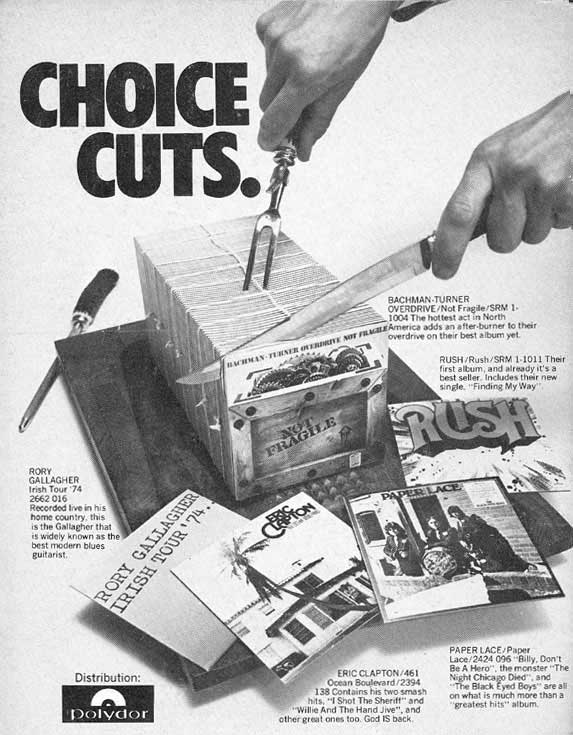
Geddy Lee is the frontman, though no one has officially declared him as such. His vocals are difficult to describe, a delicious high pitched banshee wail that owes much to a bad case of post-nasal drip. Let it suffice to say that at some early stage in his life, Geddy must have slipped off his bicycle seat and into the crossbar awful hard. His bass playing is methodical and somewhat pedestrian, but the structure of their material allows little else. Yet he has been known to really 'cook' (a cool word fer all you hep cats) and he shakes like a palsied junkie when he steps up to the microphone. Totally confident in his abilities to get the joint jumpin', Geddy just stands and lets the feeling move him.
Alex Lifeson, between living chapters of the Teenage Dream, has studied hot guitar pyrotechnics to the point where he can let his fingers do the talking. A devout fan of Beck and (especially) Page and all other guitarro monsters, Lifeson watches his fretboard closely and actually seems amazed when he wrestles out the right riffs. He can be obviously pleased with the sound, something few technically good guitarists have time for. "God is the music, I'm just the instrument" some will say. Not Alex! Like a heathen in heat, he knows that it's him popping all the right notes and he's proud. No religious experiences for this kid.
Neil Peart flais away at his massive kit, filling in any gaps and touching all the bases. "I draw from a lot of sources," he says, admitting that he has a place in his heart for a chosen few percussionists. "But I suppose visually the closest comparison would be Keith Moon." No small feat, folks.
Now that Mercury has sunk two hundred big ones into Rush and the band has had some exposure in the States, does it look like the investment is going to pay off for all involved. Geddy, without false modesty or hyperbole, explains the current situation. The reaction to our American gigs has been great. A friend of ours took a copy of the album on Moon Records and sent it to a friend of his who is the programmer for WMMS in Cleveland. We got a call from her immediately saying that they had only played one song on the air and they got about fifty calls on it from people who wanted to know who it was. Since then WMMS has worn the grooves off the record and Mercury says the sales are doing well, better than even they expected."
At press time, the album has just entered the charts, the much coveted 'bullet' affixed. The sales figures are definitely healthy and a number of gigs have resulted in great word of mouth excitement about this 'new Canadian discovery'. Rush. Geddy puts it more succinctly.
"We didn't believe the reaction we got in the States. Especially in the Mid-west. The kids are really hungry for music. They're not afraid to show you that they like you. In fact they go nuts if they like you. American kids are crazy. We love 'em."
QUEEN FER A DAY
Photo Story by Paul Sterling
Click photos to enlarge
Actually, it's Rok Kritik Fer A Day. Heavy Metal trio Rush decided it was about time they found out what in tarnation "Heavy Metal' means. So they elected to ask the experts, the boys and girls at Beetle Magazine. They were so impressed with our laidback lifestyle that they decided, "Well. what the hell; there's nothing to this rock writer biz that we can't do." So here's what happened when Rush took over Beetle's offices fer a day.
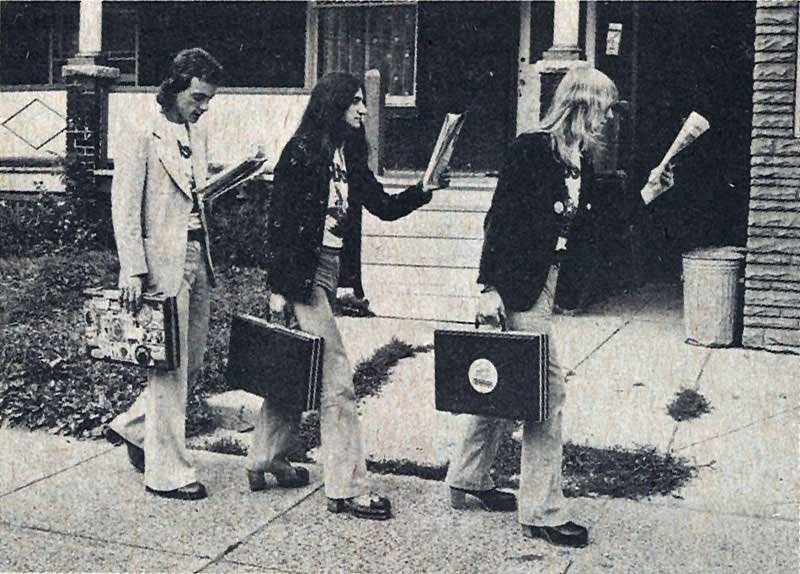
1. It's off to work we go-ho-ho. Early in the morning, the three newly annointed business types fight their way through the traffic of Bathurst Street in order to be on time, just like all good Beetle staffers do. Notice that Neil holds his morning paper lower than the other two. That's 'coz he likes in-depth news.
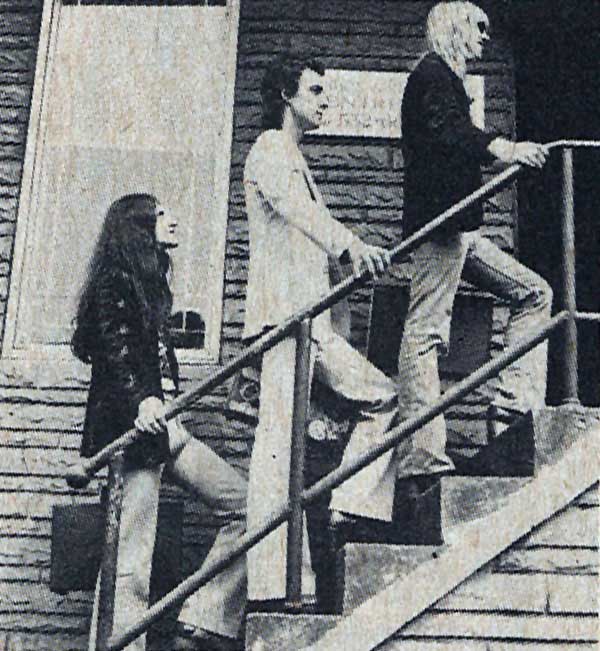
2. Our heroes ascend the stairway that leads to the massive Beetle complex. Not accustomed to the hard, rigorous businessman's lifestyle, Alex wonders: "Golly, why can't the roadies carry my attache case?"
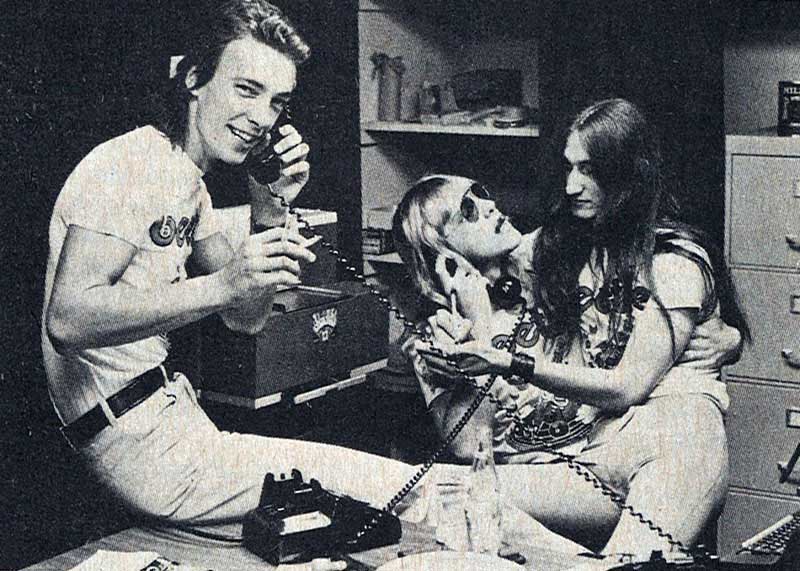
3. Pretty young Geddy takes dictation while Alex proposes something obscene. Thse boys catch on fast. On the side Alex makes massive financial deals with record company residents while Neil, who is gallantly attempting to hustle some advertising, is prepared to spend the rest of his natural life on hold.
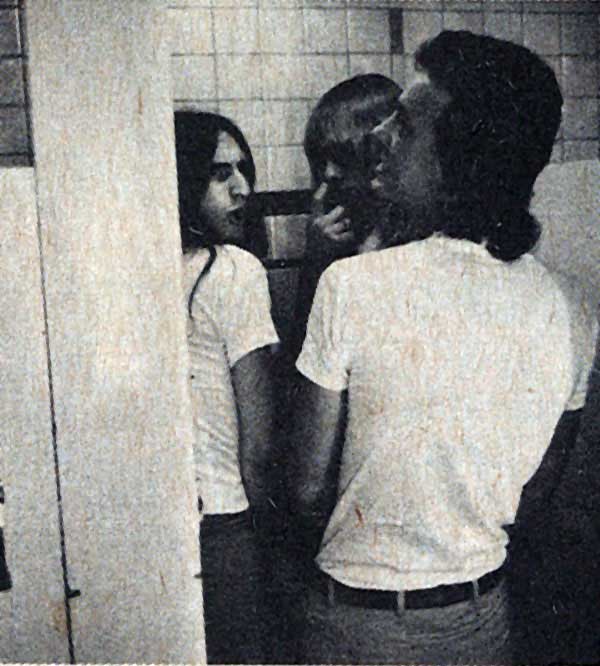
4. Tho' it's still early in the day, it's becoming clear that this magazine biz is not all it's cracked up to be. Neil sings "Here Come The Warm Jets". Geddy says, "We aim to please, will you aim too please!" while Alex prepares a snack for himself.
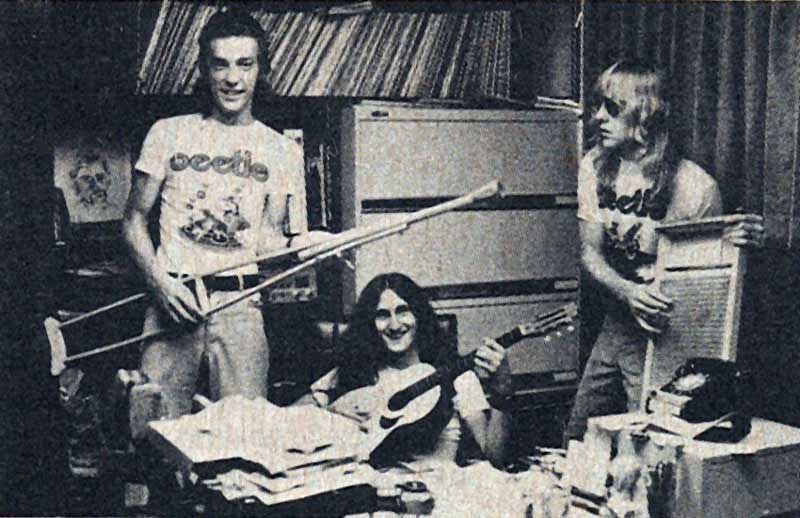
5. Foregoing the Beetle staffer's usual modest repast of dogmeat pie (available across the street) and mud coffee (just north), our heroes opt fer a little rock. Geddy proves that he knows which end of the guitar one should pose behind, Alex finally washes his hands and Neil models an all-purpose drumstick.
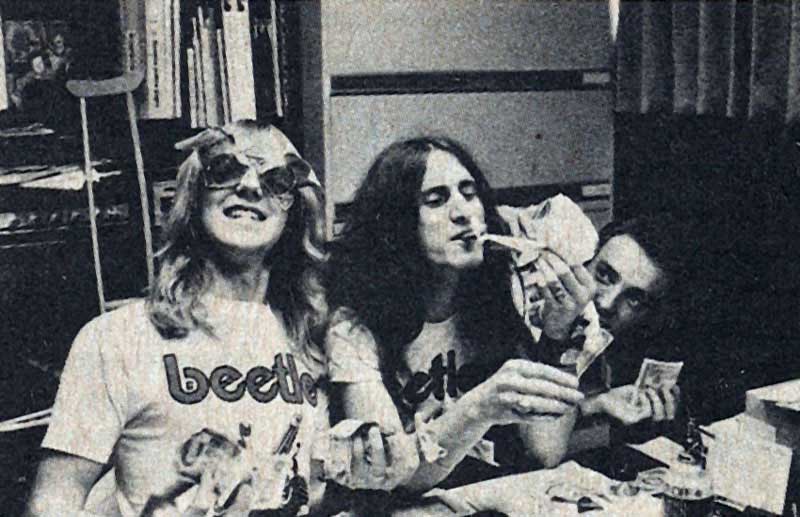
6. It's time to tackle the publisher's job! Let's count the money! Let's do nothing for the rest of the day! Let's sit around and watch the slaves work their butts off for their measly weekly wages! Let's light our fat cigars with crisp dollar bills! Actually our publisher's not like that. He doesn't smoke.
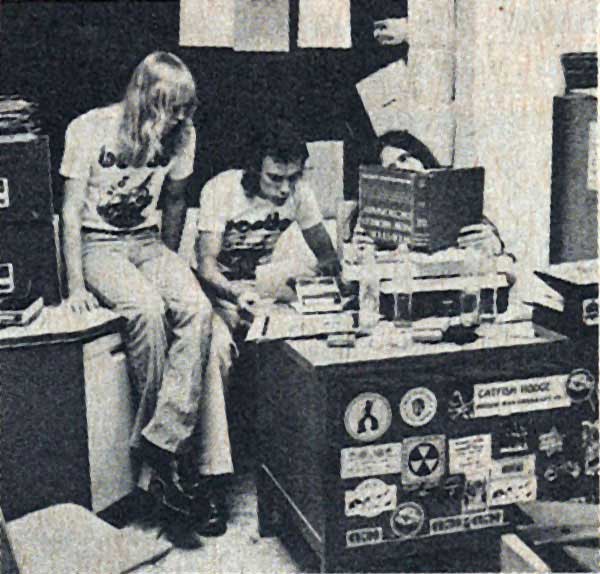
7. Now it's time to clean up the editorial end. But we can't file anything, 'coz then the editor could never find it. We can't peel the stickers off his desk, 'coz then he couldn't remember the name of any bands.
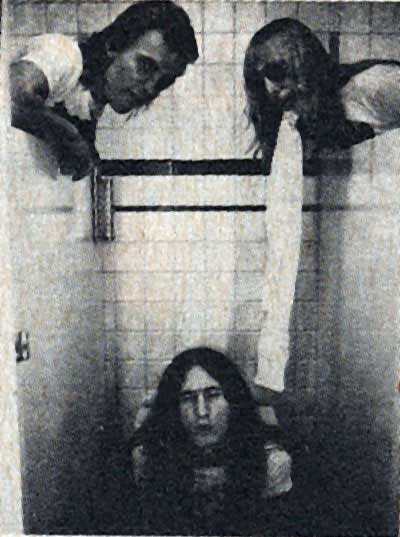
8. Well, it's back to the old can. Geddy's having problems with his breakfast. The old Rice Krispies can't decide which end to come out. And with the other two voyeurs hanging about, Geddy's having problems getting in the mood.
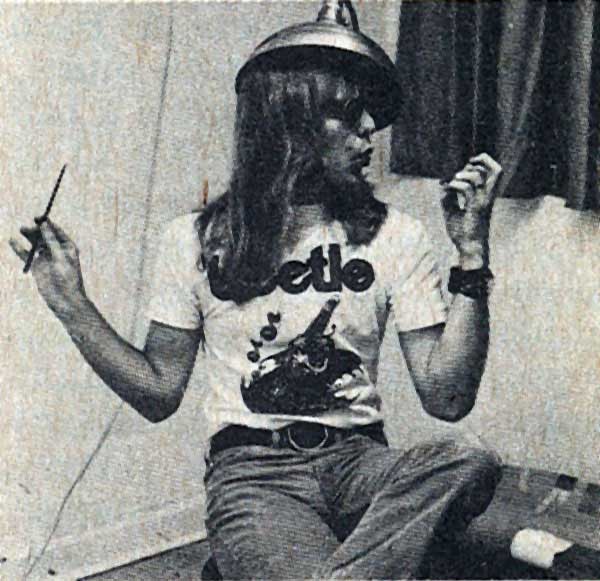
9. It's getting nigh on showtime and Alex feels he must prepare for the evening's gig. The beauty parlor was never like this, which also explains why Alex has never been beautiful. However, we have no snappy lines to explain why Alex wears dark glasses in the office.
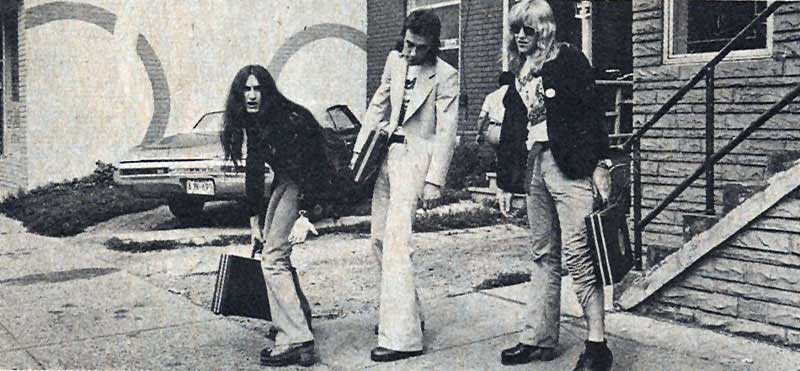
10. "Tis the end of the day and our heroes are convinced that the publishing biz really ain't such a hot way to make a living. Tired from a full day of takin' care of business. Rush decided that three chord boogie beats out eight hour monotony any day. So as our heroes slowly drag their butts off into the sunset, we bid a fond farewell to lovely Bathurst Street where the natives are hard at work, straining overtime to get out the next ish.